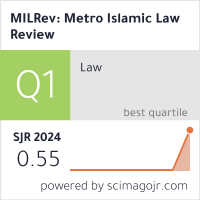The Problems of Neuroparenting Based on Contemporary Islamic Family Law
DOI:
https://doi.org/10.32332/milrev.v3i2.9791Keywords:
Childcare, Contemporary Islamic Family Law, Maqāshid al-Shari'ah, Neuroparenting.Abstract
Parenting in the family has an impact on the child in all aspects. A contemporary approach to child care will produce an effective and appropriate model for current conditions. Neuroparenting is a contemporary parenting model that is starting to be adopted by many families, especially in Indonesia. This article aims to examine the concept of neuroparenting and find its relevance to contemporary Islamic family law. This article is a qualitative descriptive research whose data was collected from related literature. Literature data was obtained from journals and books that discuss neuroparenting and contemporary Islamic family law, which focuses on discussing the purpose of Islamic law (maqāshid al- al-sharīah). The data was then reduced, presented, and analyzed using an inductive method using hadanah theory and maqāshid al-sharīah to conclude. The research results show that parenting today cannot be separated from developments in science and technology, including neuroparenting. Neuroparenting is a parenting model that uses a medical approach to neuroscience studies. Neuroparenting helps direct child care tailored to gender, age, existing facilities, and infrastructure in the family, especially parents. The implementation of neuroparenting has been under the goals of Islamic law as a form of integration of contemporary science
Downloads
References
Ahmat Miftakul Huda, and Suyadi. “Otak Dan Akal Dalam Kajian Al-Quran Dan Neurosains.” Jurnal Pendidikan Islam Indonesia 5, no. 1 (2020): 67–79. https://doi.org/10.35316/jpii.v5i1.242. DOI: https://doi.org/10.35316/jpii.v5i1.242
Aisah Dahlan. Maukah Jadi Orangtua Bahagia? Jakarta: Pustaka Elmadani, 2022.
Aisah Dahlan, ddk. Kenali Watak Agar Jiwa Tenang. Jakarta: Pustaka Elmadani, 2022.
Al-Sharmani, Mulki, and Sanna Mustasaari. “Islamic Family Law(s) in Finland: Reflections on Freedom of Religion from the Wellbeing Perspective.” Temenos 58, no. 2 (2022): 217–38. https://doi.org/10.33356/temenos.113886. DOI: https://doi.org/10.33356/temenos.113886
Arfiansyah, Nanda Amaliana, and Anton Widyanto. “The Emerging Practice of Matrifocality and Its Implication to the Practice of Islamic Law Family: A Case from Gayo Community, Indonesia.” Jurnal Ilmiah Islam Futura 23, no. 2 (2023): 380–403. DOI: https://doi.org/10.22373/jiif.v23i2.18209
Aslati, Armi Agustar, Silawati, Arisman, and Siti Arafah. “Utilizing Science and Maqāṣid Al-Sharī’ah in Resolving Contemporary Issues of Islamic Family Law.” Al-Manahij: Jurnal Kajian Hukum Islam 18, no. 1 (2024): 17–36. https://doi.org/10.24090/mnh.v18i1.10571. DOI: https://doi.org/10.24090/mnh.v18i1.10571
Aufiqurohman, Nelli Fauziah. “The Evaluation of Maqāṣid Asy-Syarī’ah on Discourses of the Islamic Family Law.” El-Usrah: Jurnal Hukum Keluarga 6, no. 1 (2023): 81. DOI: https://doi.org/10.22373/ujhk.v6i1.13035
Ayun, Qurrotu. “Pola Asuh Orang Tua Dan Metode Pengasuhan Dalam Membentuk Karakter Anak.” Jurnal IAIN Salatiga 5, no. 1 (2017). DOI: https://doi.org/10.21043/thufula.v5i1.2421
Azzahra, Fadia, Debbie Nomiko, Nur Insani, and Novi Kresnawaty. “Pengaruh Pengasuhan Positif Terhadap Perkembangan Anak Usia Dini Berdasarkan Parents Evaluation of Developmental Status ( PEDS )” 5, no. 2 (2024). https://doi.org/10.37985/murhum.v5i2.984.
Casula, Mattia, Chiara Leonardi, and Massimo Zancanaro. “How Does Digital Technology Impact on the Co-Production of Local Services? Evidence from a Childcare Experience.” Public Money and Management 42, no. 2 (2022): 87–97. https://doi.org/10.1080/09540962.2020.1728066. DOI: https://doi.org/10.1080/09540962.2020.1728066
Clarke-Sterwart, Alison, Virginia D. Allhusen. What We Know About Childcare. United States: President and Fellows Harvard College, 2005. DOI: https://doi.org/10.4159/9780674271487
Cruz, Alejandro Nieto. “Discrimination of Women in Islamic Family Law and Public Order.” Cuadernos de Derecho Transnacional 12, no. 1 (2020): 286–318. https://doi.org/10.20318/cdt.2020.5190. DOI: https://doi.org/10.20318/cdt.2020.5190
Diana, Raden Rachmy, Muhammad Chirzin, Khoiruddin Bashori, Fitriah M. Suud, and Nadea Zulfa Khairunnisa. “Parental Engagement on Children Character Education: The Influences of Positive Parenting and Agreeableness Mediated by Religiosity.” Cakrawala Pendidikan 40, no. 2 (2021): 428–44. https://doi.org/10.21831/cp.v40i2.39477. DOI: https://doi.org/10.21831/cp.v40i2.39477
Djawas, Mursyid, Hedhri Nadhiran, Sri Astuti A. Samad, Zahrul Mubarrak, and Muhammad Abrar Azizi. “Creating Family Resilience in Indonesia: A Study of ‘Marriage Guidance’ Program in Aceh and South Sumatera Mursyid Djawas Hedhri Nadhiran Sri Astuti A. Samad.” Jurnal Hukum Dan Pranata Sosial 17, no. 1 (2022): 299–324. DOI: https://doi.org/10.19105/al-lhkam.v17i1.6150
Elimartati, Nailur Rahmi, Widi Nopiardo, Firdaus, and Vasco Fronzoni. “Family Instability: A Study of Livelihoods during the Covid-19 Pandemic in Tanah Datar Regency, Indonesia.” Juris: Jurnal Ilmiah Syariah 22, no. 1 (2023): 93–104. https://doi.org/10.31958/juris.v22i1.6054. DOI: https://doi.org/10.31958/juris.v22i1.6054
Fauzan, Ahmad, and Hadi Amroni. “The Concept Of Sakīnah Family In The Contemporary Muslim Generation.” Al-’Adalah 17, no. 1 (2020): 51–70. https://doi.org/10.24042/adalah.v17i1.6458. DOI: https://doi.org/10.24042/adalah.v17i1.6458
Feldman, Ruth. “What Is Resilience: An Affiliative Neuroscience Approach.” World Psychiatry 19, no. 2 (2020): 132–50. https://doi.org/10.1002/wps.20729. DOI: https://doi.org/10.1002/wps.20729
Fitri, Sholeha. “Pengaruh Perkawinan Di Bawah Umur Terhadap Pengasuhan Anak.” El-Usrah: Jurnal Hukum Keluarga 4, no. 2 (2021): 517. DOI: https://doi.org/10.22373/ujhk.v4i2.8595
Gad Makhlouf, Ahmed. “The Doctrinal Development of Contemporary Islamic Law: Fiqh Academies as an Institutional Framework.” Oxford Journal of Law and Religion 10, no. 3 (October 1, 2021): 464–86. https://doi.org/10.1093/ojlr/rwac005. DOI: https://doi.org/10.1093/ojlr/rwac005
Hanapi, Agustin, Sarina Aini, and Cut Endang Puspa Sari. “Bridging Fiqh and Positive Law: A New Paradigm for Child Legality and the Best Interest of the Child in Indonesia.” Juris: Jurnal Ilmiah Syariah 23, no. 2 (2024): 293–308. https://doi.org/10.31958/juris.v23i2.10712.
Haq, Taufiq Ziaul. “Pola Asuh Orang Tua Dalam Perilaku Sosial Generasi Millenial Ditinjau Dari Neurosains.” Al-Mada: Jurnal Agama, Sosial, Dan Budaya 3, no. 1 (2020): 88–108. https://doi.org/10.31538/almada.v3i1.609. DOI: https://doi.org/10.31538/almada.v3i1.609
Harfi Muthia Rahmai. Buku Babon Membaca Karakter Dan Kepribadian. Psikologi Corner, 2020.
Indriyani, Rahmawati, Sri Haryanto, and Sofan Rizqi. “Konsep Neuroparenting Dan Implementasinya Dalam Pembentukan Karakter Anak.” Jurnal Al-Qalam 24, no. 02 (2023): 15–22.
Joffe, C.E. Friendly Intruders: Childcare Professionals and Family Life. United States: University of California, 2024. DOI: https://doi.org/10.2307/jj.13167948
John W. Creswell, J. David Creswell. Research Design. 6th ed. California: Sage Publication, 2022.
Margaret Burchinal, Katherine Magnuson, Douglas Powell, Sandara Soliday Hong. “Early Childcare and Education.” In Handbook of Child Physicology and Developmental Science, 225. United States: John & Wiley, Son, Inc, 2015. DOI: https://doi.org/10.1002/9781118963418.childpsy406
Martin, Claude. From Educating Mothers to Neuroparenting Ideas and Controversies in Parenting Issues. London: Routledge, 2024. DOI: https://doi.org/10.4324/9781003377207-11
Mulyo, Mufrod Teguh, Khoiruddin Nasution, Samin Batubara, Siti Musawwamah, and Raihanah Abdullah. “The Power of Husband-Wife Communication in Building Family Resilience and Preventing Divorce: A Study of Maṣlaḥah Mursalah.” Al-Manahij: Jurnal Kajian Hukum Islam 17, no. 2 (2023): 125–36. https://doi.org/10.24090/mnh.v17i2.7651. DOI: https://doi.org/10.24090/mnh.v17i2.7651
Mumpuniarti, Mumpuniarti, Gena Diniarti, Wening Prabawati, and Suparno Suparno. “Family Nurture in the Social Skills Development of Children With Intellectual Disabilities Through Daily Activities.” Cakrawala Pendidikan 40, no. 3 (2021): 625–36. https://doi.org/10.21831/cp.v40i3.43984. DOI: https://doi.org/10.21831/cp.v40i3.43984
Naqvi, Ali Raza. “Modern Reforms In Muslim Family Laws — A General Study.” Islamic Research Institute, International Islamic University, Islamabad 13, no. 4 (1974): 18.
Nasohah, Zaini. “Dynamics of Islamic Family Law in Facing Current Challenges in Southeast Asia.” Samarah: Jurnal Hukum Keluarga Dan Hukum Islam 8, no. 1 (2024): 1. https://doi.org/http://dx.doi.org/10.22373/sjhk.v8i1.16553. DOI: https://doi.org/10.22373/sjhk.v8i1.16553
Nasution, Khoiruddin, and Syamruddin Nasution. “Implementation of Indonesian Islamic Family Law To Guarantee Children’S Rights.” Al-Jami’ah 59, no. 2 (2021): 347–74. https://doi.org/10.14421/ajis.2021.592.347-374. DOI: https://doi.org/10.14421/ajis.2021.592.347-374
Nur, Iffatin, Ali Abdul Wakhid, and Lestari Handayani. “A Genealogical Analysis of the Concept and Development of Maqashid Syarī‘Ah.” Al-’Adalah 17, no. 1 (2020): 1–30. https://doi.org/10.24042/adalah.v17i1.6211. DOI: https://doi.org/10.24042/adalah.v17i1.6211
Permata, Indah, Masduki Asbari, Ariansyah, and Merita Aprilia. “Pengaruh Kecerdasan Intelektual Dan Kecerdasan Emosional Dalam Perspektif Neurosains Di Dunia Pendidikan.” Journal of Information Systems and Management (JISMA) 3, no. 2 (2024): 60–64.
Pestoff, V. Citizens and Co-Production of Welfare Services: Childcare in Eight European Countries. London: Routledge, 2011.
Pinti, Paola, Ilias Tachtsidis, Antonia Hamilton, Joy Hirsch, Clarisse Aichelburg, Sam Gilbert, and Paul W. Burgess. “The Present and Future Use of Functional Near-Infrared Spectroscopy (Fnirs) for Cognitive Neuroscience.” Annals of the New York Academy of Sciences 1464, no. 1 (2020): 5–29. https://doi.org/10.1111/nyas.13948. DOI: https://doi.org/10.1111/nyas.13948
Piwko, Aldona. “Contemporary Islamic Law between Tradition and Challenges of Modernity: Some Examples Worth Consideration.” Bogoslovni Vestnik 81, no. 1 (2021): 91–101. https://doi.org/10.34291/BV2021/01/PIWKO. DOI: https://doi.org/10.34291/BV2021/01/Piwko
Rachmawati, Yeni. “Pengembangan Model Etnoparenting Indonesia Pada Pengasuhan Anak.” Jurnal Obsesi : Jurnal Pendidikan Anak Usia Dini 5, no. 2 (2020): 1150–62. https://doi.org/10.31004/obsesi.v5i2.706. DOI: https://doi.org/10.31004/obsesi.v5i2.706
Snoek, Anke, and Dorothee Horstkötter. “Neuroparenting: The Myths and the Benefits. An Ethical Systematic Review.” Neuroethics 14, no. 3 (2021): 387–408. https://doi.org/10.1007/s12152-021-09474-8. DOI: https://doi.org/10.1007/s12152-021-09474-8
Ulfah, Maulidya. Neuroparenting: Model Stimulasi Perkembangan Otak Anak. Yogyakarta: Perkumpulan Pendidikan Islam Anak Usia Dini, 2023.
Wahb, Yousef Aly. “Competing Authorities: Islamic Family Law and Quasi-Judicial Proceedings in North America.” American Journal of Islam and Society 39, no. 3–4 (2022): 87–111. https://doi.org/10.35632/ajis.v39i3-4.2993. DOI: https://doi.org/10.35632/ajis.v39i3-4.2993
Watson, Amanda, Dorothea Dumuid, Carol Maher, Francois Fraysse, Chelsea Mauch, Grant R Tomkinson, Ty Ferguson, and Tim Olds. “Parenting Styles and Their Associations With Children’s Body Composition, Activity Patterns, Fitness, Diet, Health, and Academic Achievement.” Childhood Obesity 19, no. 5 (August 10, 2022): 316–31. https://doi.org/10.1089/chi.2022.0054. DOI: https://doi.org/10.1089/chi.2022.0054
Williams, Joanna. Women vs Feminism: Why We All Need Liberating from the Gender Wars. Canterbury, UK: Emerald Publishing, 2017. DOI: https://doi.org/10.1108/9781787144750
Yusuf, Hanifa Listia. Perbedaan Otak Laki-Laki Dan Otak Perempuan Dalam Membentuk Keluarga Sakinah: Studi Terhadap Konsep Neurosains Aisah Dahlan. Yogyakarta: UIN Sunan Kalijaga, 2020.
Downloads
Published
Issue
Section
License
Copyright (c) 2024 Ahmad Fauzan, Ilma Silmi Nufus

This work is licensed under a Creative Commons Attribution-ShareAlike 4.0 International License.










